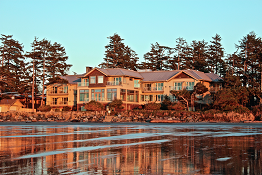Recovery will be market by market, and we can take cues from hotels that are already welcoming back guests in this new normal.

By Jason Q. Freed
Like many things across the hospitality industry, “recovery” is difficult to generalize – in fact, traveler demand will return to each market, each segment and each chain scale differently.
As evidenced by the 61-room Long Beach Lodge Resort in Tofino, British Columbia, the local resort segment in Canada is already back on track. If your property sits on the beach and serves a drive market of city-dwelling surfers looking to escape for the weekend, you might be lucky enough to be in the same boat.
After shutting down for more than two months, Long Beach Lodge opened June 3 in a very controlled environment, limiting occupancy until each department was comfortable adjusting to a new normal. Since COVID, the resort – located on Vancouver Island on the westernmost edge of Canada – has shifted from an international tourist destination to a locals getaway without skipping a beat. In June, the resort posted 62% occupancy, down from 84% historically in the same month.
Director of Revenue Management Heather Riddick said she’s been able to get her property’s occupancy back in line without sacrificing rate. ADR was down slightly in June but is up nearly 30% year over year in July and August with greater than 70% occupancy already on the books.
“That’s our B.C. market dedicated to playing in their own backyard. This is the summer and year to stay close,” Riddick said via phone last week. “Tofino is not only popular on an international scale, but we’re on the Canadians’ bucket lists as well.”
Riddick said the shift from targeting international guests – which is historically 50% of summer demand at the Long Beach Lodge – to a more local demographic has come with its nuances. She relies less on OTA demand and more on social media marketing. Using Facebook and Instagram, she’s been able to capture rack rate as opposed to international wholesaler rates.
“We’re doing business a little bit differently,” Riddick said. “We’re not going to sell out. We’re not taking any one-nighters, and we’re not doing room moves because of the effort that it takes for our staff. So, because they’re still paying full rate; we have to manage our guest expectations a bit more.”
Riddick said she will wait until mid-summer before turning to OTA channels, currently only taking about 10% of her business through distribution partners.
“We’ve always been open with OTAs,” Riddick said. For her, it’s about managing the channels based on her property’s guest makeup and needs. For European travelers, she turns to Booking.com, while Expedia is used heavily by the Canadian market, she said. She always remembers to explain to guests that booking through an OTA isn’t as flexible as direct methods.
“They learn quickly,” she said.
What’s Different Post-COVID?
Riddick said the key to success in the current post-pandemic environment will be communication and education. Staff at Long Beach Lodge have very detailed conversations with guests at the time of booking and then again seven days prior to arrival.
The hotel is following all marking and signage protocol, and all employees have reviewed local workplace regulation documents. It took some time, but “employees across all departments are feeling comfortable,” Riddick said.
For a revenue manager, Riddick said she has to pay much closer attention to everyday demand shifts in the market, rather than taking a longer, macro approach. The Long Beach Lodge uses Windsurfer CRS and Wave RMS from SHR to analyze booking trends from all sources and makes dynamic pricing recommendations by channel.
Riddick is cautious not to overwhelm staff by filling the hotel without proper advanced notice. She checks daily with the executive housekeeper to be sure cleanliness and guest expectations can be met at certain occupancy levels.
“That’s why we’ve left our rates where they are. By not putting deals out there, we can have more control over our occupancy,” she said.
Riddick said early post-COVID travelers are often waiting until the last minute to book, even booking same-day stays.
She’s lucky to be getting a headstart, and soon will be shifting focus to looking ahead to the fall.
“We’re monitoring whether or not there will be another shutdown and preparing for that,” Riddick said. “But so far, our success has really been a team effort. Before, I would set and drive the strategy – now, we are all communicating and working together.”
Read more helpful resources on our COVID-19 Help Page.


